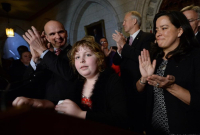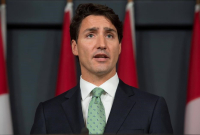Support strong Canadian climate journalism for 2025
Members of Canada's LGBTQ2 community say there are no two ways to interpret Conservative Party leadership candidate Pierre Lemieux's plan to protect "free speech" in Canada. It's transphobic, they argue, and utterly disappointing.
Lemieux announced a policy platform Monday that would bar government enforcement of "political correctness" regarding gender pronouns, and move to repeal proposed legislation that protects Canadians from discrimination based on gender expression or identity.
“Freedom of speech in Canada is under attack,” the former Ottawa-area MP said in a campaign email. “Protection from discrimination is entirely different from not wanting to be offended. Chronic political correctness is strangling free and respectful debate in Canada and it has to stop.”
Lemieux took aim at Bill C-16, which if passed by the Senate, would add gender identity and gender expression to the list of prohibited grounds of discrimination, and extend the Criminal Code's protection against hate propaganda to any section of the public that is distinguished by those elements.
"Canada is already a safe space," he argued. "Soon Canadians will be forced to use invented pronouns like “hir”, “ze”, “ver”, “xemself” to address members of the transgender community or face fines and penalties."
Members of Canada's LGBTQ2 community fundamentally disagreed.
A platform based on "hate"
"This is a platform run on hate," said Keya Prempeh, programming coordinator for Carleton University's Gender and Sexuality Resource Centre. "This is somebody who is supposed to talk about 'democracy, family, and security,' but is trying to remove protection from a group of people who is already so marginalized."
Prempeh, who identifies as trans and queer, recognized the confusion and difficulties some people may face when confronted with pronouns that aren't 'he' or 'she,' but said many cultures around the world have been using non-binary gender identities for centuries. Prempeh uses the pronoun 'xe' and said the incredible courage it takes to admit to a stranger that you aren't cisgendered should be respected.
Cisgendered is the adjective that describes an individual whose sense of personal identity or gender corresponds with their sex at birth.
"It’s so brave of people to say they want this to be their reality, and for someone in such a place of power to shit on that basically — it’s just astounding to me,” xe told National Observer. “Even his line about how Canada is already a safe space… I wonder, who is it a safe space for?
"Certainly not queer and trans people, who are literally being murdered, not getting jobs, and being kicked out of our homes for who we are.”
Lemieux's platform referenced the work of University of Toronto professor Jordan Peterson, a clinical psychologist and well-known critic of political correctness. He said he would invite Peterson, who has been threatened and insulted for refusing to use non-binary pronouns when addressing students, to form a committee to review Canadian speech laws to ensure they are balanced and reasonable with regard to political correctness.

When asked to respond to allegations that his plan is transphobic and discriminatory, Lemieux told National Observer in an email that free speech is a privilege afforded to all Canadians, "including the LGBTQ2 community." He said Canadians are always free to use "transgender pronouns" when addressing someone else, but nobody should be forced to do so by law.
"Given that current laws in Canada already provide adequate protections, Bill C-16 drives a politically correct narrative that reinforces the attitude that everything down to everyday word use should be regulated by the government and that is dangerous for Canadians' right to free speech," he said. "It’s time governments stop this chronic political correctness."
Boyd Kodak, chair of the Toronto Trans Alliance, fired back:
"It's not about inconveniencing others like Mr. Lemieux and Dr. Peterson by them having to adapt and evolve; it's about not being hateful and invoking a hostile environment. No one is telling them what they must believe, just that they cannot spew their venom in society. These comments should not be coming from two men in their position....They are behaving like bullies."
Bill C-16 more about behaviour than words
Bill C-16 is not about criminalizing pronoun misuse, says Brenda Cossman, a law professor at the University of Toronto. Even if the legislation is passed, she says it's unlikely that refusal to use the appropriate pronoun without some additional offence would rise to the threshold of hate speech required to prosecute.
"Hate speech laws in Canada have only been used, and only can be used, against extreme forms of speech – explicitly and extreme forms of homophobic, anti-Semitic or racist speech," Cossman wrote in a recent blog post for the university. "Moreover, prosecution needs the approval of the attorney general."
Morgane Oger, a transgender-rights activist and chair of the Trans Alliance Society, agreed and said the legislation, in practice, would sooner protect her from being refused service at a bank based on her gender identity than protect her from someone calling her "Mr. Oger" instead of "Ms. Oger."
Most provinces and territories already include gender identity and expression in their Human Rights Codes, she added, including the Northwest Territories, Ontario, Nova Scotia, Prince Edward Island, Newfound and Labrador, Saskatchewan and Alberta. It's time for Lemieux and the federal government to catch up, she said.

"What’s happening here is some individuals who are trying to cause trouble are using hyperbolic and wrong statements to press their points," she told National Observer. “All the Criminal Code is doing is adding the provision to gender identity and gender expression that is already there for, for example, religious identity or expression, race and others. There’s nothing more to this than that, and unfortunately there are some people in society and politics that prey on the underinformed."
Oger is running as an NDP candidate in B.C.'s provincial election this spring, and if elected, would be Canada's first transgender MLA. She said she works hard to dispel hateful rhetoric, and encouraged the public to see Lemieux's platform for what it really is.
"It’s a sad, sad state that the federal Conservatives have people who are offering to be leaders who don’t understand the laws they would be making,” she said. "You would think that in 2017, the federal Conservatives would have learned their lesson."
Lemieux is one of 14 candidates running in the Conservative leadership race, which ends with a vote on May 27. Despite pundits having said that the race has no clear front-runner, a new poll by Insights West found that only four of them — Lisa Raitt, Kevin O'Leary, Kellie Leitch, and Maxime Bernier — are actually familiar to a majority of Canadians.
Lemieux served as parliamentary secretary to the ministers of veterans affairs and agriculture during nearly 10 years of service under the Harper government before losing his seat in the 2015 federal election. He was a soldier in Canadian Armed Forces for two decades and is a husband and father of five children.






Comments
I believe there is a key difference between appropriately penalizing hate speech (for which laws presently exist), and granting the legal opportunity to penalize people for the incorrect use of a gender pronoun for which they have no awareness. I'd be very curious to see what results would come from a national survey polling Canadians to describe to which gender the pronoun "ver" is to apply. And considering that those same Canadians could potentially be prosecuted, and their lives ruined, for not correctly utilizing a term for which they have no understanding is frightening. Jordan Peterson appeared on the Joe Rogan podcast and they had a very interesting conversation on the topic. You can see it here: https://www.youtube.com/watch?v=04wyGK6k6HE
I don't see anything in the wording of Bill C-16 that says you're guilty of a hate crime if you don't use invented pronouns. On the other hand, I don't see anything wrong with what Lemieux said. Free speech is a thing. If people don't want to use these pronouns, no one can or should force them.
If Bill C-16 actually does attempt to force the use of non-gender or trans-gender pronouns, then I heartily agree it goes too far. This said, the words we use when we converse with or address people are important. For example, it is no longer acceptable to assume that a woman's husband is a man, or that a boy never likes pink. Apparently, C-16 presses home that we cannot assume that a person has any gender in particular. We can always be more sensitive to everybody with whom we communicate or communicate about, and the issue of gender in our words deserves attention.
My perspective is that laws are useful when it comes to protection from harm. Hateful language and propaganda such as that which has endlessly spewed from the mouth of Donald Trump and now his pen, does irreparable harm such as immigration hardships, and the hateful act we just witnessed in Quebec. The language we use reflects the thoughts we have inside. In the worst case, the hateful messages we utter, give permission to nut-cakes to act on them.
Education is really the key to teaching sensitivity. Education in sensitivity, is already happening in schools. Such education is also effectively spread by government ads and literature. And of course, we educate each other and our children, by modeling sensitive behavior in all respects including the words we choose.
Nobody ever reacts well when one group of people imposes their point of view on them, whether it be a minority imposition on the majority, or the other way around. Over the many decades I have lived, my own perspectives have dramatically evolved, but it has always taken time and consideration before those perspectives have fully matured. Thoughtful conversation has always been the greatest agent of change in my life.
Calling somebody a homophobe because that person argues that a bill restricting the use of pronouns is a restriction of free speech, is actually no better than calling somebody a name for being homosexual. Let's be kind to each other folks. Let's carefully consider everybody's perspective, no matter how offensive we may find it to be. With time and mutual respect, we can all live better together.